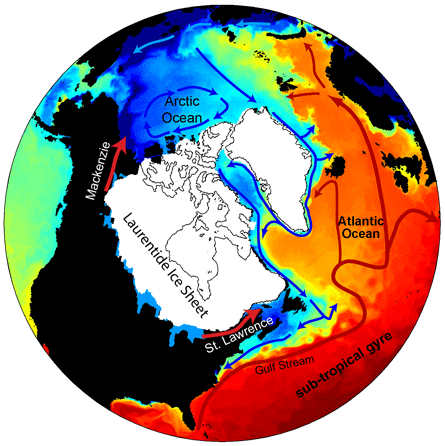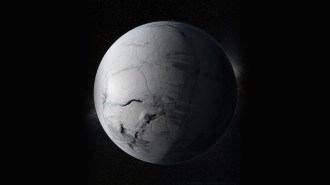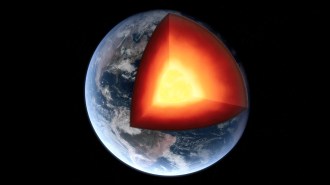Natural disasters in the Arctic aren’t always a sign of global warming. A catastrophic deluge of freshwater pouring into the Arctic Ocean from northwestern Canada might have triggered the planet’s last major cold spell nearly 13,000 years ago, a new study finds. That’s a different pathway than the standard explanation for this big chill.

New computer simulations indicate ocean currents would have transported the Arctic floodwaters to the North Atlantic near Greenland, where the freshwater would have disrupted the ocean’s circulation of heat. Freshwater flowing into the Atlantic through Canada’s Gulf of St. Lawrence — the previously hypothesized source of the flood — would have been carried too far south to disturb heat flow, researchers report online November 5 in Proceedings of the National Academy of Sciences.
“We see a more accurate picture of where the water went in the past,” says coauthor Alan Condron, a physical oceanographer at the University of Massachusetts Amherst.
The 1,200-year-long cold spell, known as the Younger Dryas, interrupted a warm period 12,900 years ago when the massive ice sheet covering much of Canada was melting. During the cold snap, temperatures in parts of the Northern Hemisphere dropped to about 10 degrees Celsius colder than they are today.
In 1989, Wallace Broecker of Columbia University suggested the Younger Dryas resulted from an abrupt overflow of Lake Agassiz, a colossal pool of meltwater along the southern edge of Canada’s ice sheet. Broecker thought the water streamed into the Great Lakes, the St. Lawrence Valley and from there into the Atlantic. The flood would have carried as much as 1 million cubic meters of water per second over the course of a year, or about a Lake Erie every six days. The lighter freshwater sat on top of the ocean’s denser salt water, preventing normal ocean mixing in the North Atlantic. This shut down the conveyor belt that brings warm waters north, which caused temperatures to plummet.
But since Broecker’s proposal, geologists haven’t found any traces of an ancient flood in the St. Lawrence Valley. And there’s no evidence that Lake Agassiz’s water levels suddenly dropped prior to the Younger Dryas, says Thomas Lowell, a glacial geologist at the University of Cincinnati in Ohio.
That led some researchers to suggest the flood might have originated somewhere along the northwestern part of the ice sheet, with water flowing north through the Mackenzie Valley and into the Arctic.
Condron and Peter Winsor of the University of Alaska Fairbanks examined both scenarios. They simulated how currents would move a torrent of freshwater through the ocean. A flood leaving the mouth of the St. Lawrence would have traveled south and met the Gulf Stream, which would have transported the freshwater about 3,000 kilometers too far south to really interfere with the ocean’s conveyor belt. This scenario suggests such a flood would have slowed heat circulation by just 14 percent.
In contrast, a flood through the Arctic’s Mackenzie Valley — taken by currents to the subpolar North Atlantic — would have weakened the ocean’s conveyor belt by as much as 32 percent. “Dumping water in the Arctic is a very efficient way to … cool the Northern Hemisphere,” says W. Richard Peltier, a physicist at the University of Toronto. The result fits with previous findings of boulders and gravels in the Mackenzie Valley that suggest a giant flood happened at the onset of the Younger Dryas. “This whole thing now hangs together beautifully,” Peltier says.
But there’s still one missing piece of the puzzle. Condron and Winsor assume most of the freshwater came from a melting dome of ice in northwestern Canada. Geologists have yet to find direct evidence that such a large pool of water actually existed, Lowell says. “We need to know whether that load of water was even available or not,” he says.
Condron plans to search for more geological clues of a Mackenzie Valley flood. He’s also running simulations of what might happen to the ocean’s conveyor belt in the future as Greenland’s ice sheet melts.







